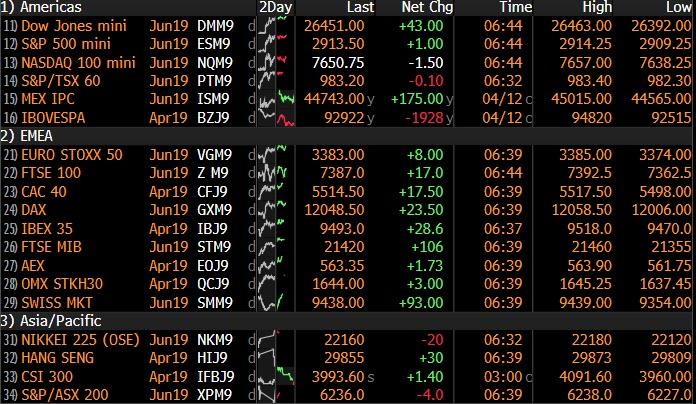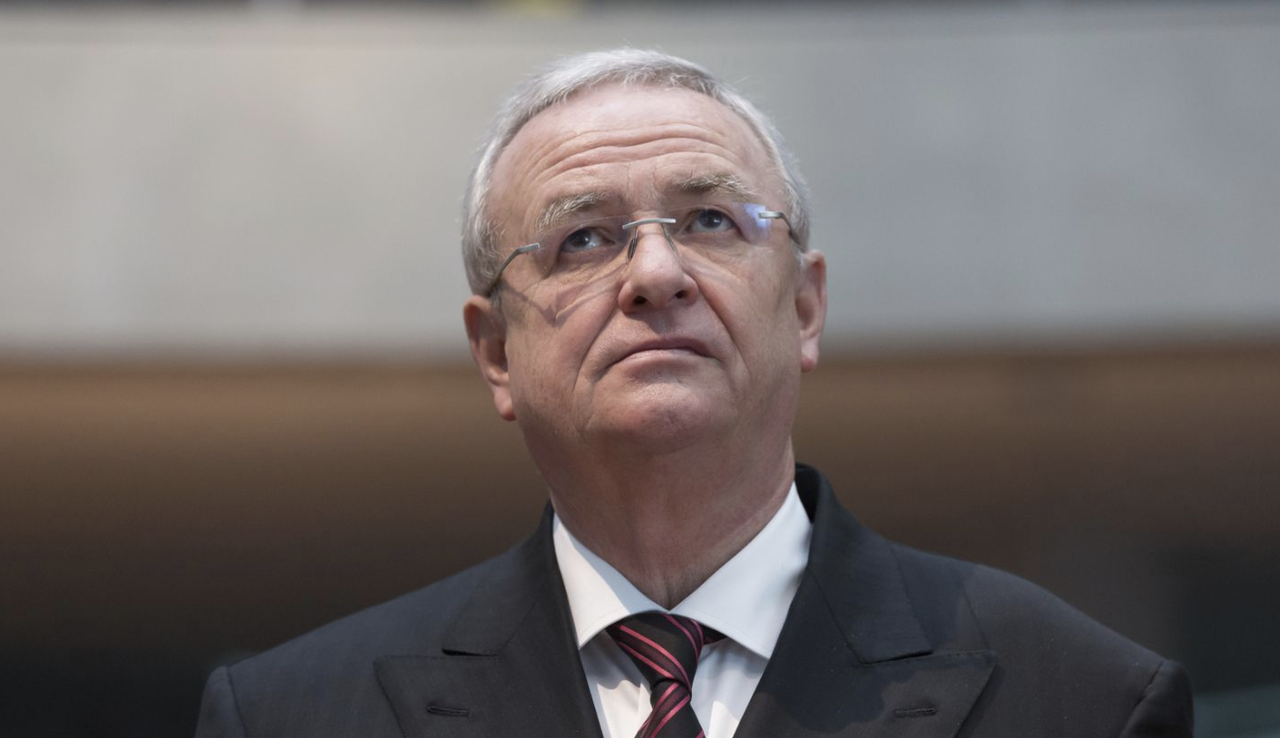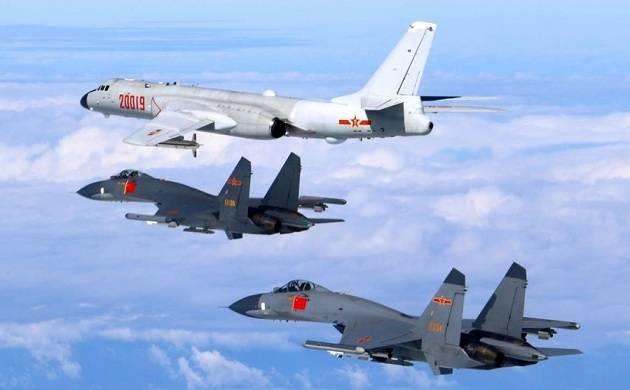This is the part in Groundhog Day where Phil Connors kills himself again, and again, and again.
With stocks itching for a new excuse to levitate higher, they got that overnight when a Reuters report on fresh “progress” in the U.S.-China trade talks and renewed “optimism” in a trade deal helped propel world stock markets to a 6-month high on steered investors away from save havens such as the Japanese yen, even as 10Y treasury yields dipped modestly, as the same catalyst that has driven stocks higher on virtually every single day in the past quarter has continued to do so again and again, right out of the cult groundhog movie.
“It seems like bullish sentiment has decent grip for now and everyone is focused on the year to date performance of the equity markets,” said Naeem Aslam, chief market analyst at TF Global Markets (UK) Ltd in London.
Overnight Reuters reported that US negotiators tempered demands that China curb industrial subsidies as a condition for a trade deal after strong resistance from Beijing, marking a retreat on a core U.S. objective for the trade talks. According to the report, in the push to secure a deal in the next month or so, U.S. negotiators have become resigned to securing less than they would like on curbing those subsidies and are focused instead on other areas where they consider demands are more achievable, Reuters sources said. Those include ending forced technology transfers, improving intellectual property protection and widening access to China’s markets, the sources said. China has already given ground on those issues.
“It’s not that there won’t be some language on it, but it is not going to be very detailed or specific,” one source familiar with the talks said in reference to the subsidies issue.
Separately, on Saturday during the latest IMF conclave, Treasury Secretary Steven Mnuchin said the US is “hopefully very close” to final round of China talks; adding that the U.S. is open to facing enforcement penalties which work “in both directions.” all of which helped spawn a fresh sense of optimism that a deal announcement was imminent.
In addition to the new trade optimism, thanks to the pleasant aftertaste from China’s credit flood in March, which exceeded all estimates, concern over global growth has also eased, fueling demand for riskier assets. MSCI’s gauge for equities saw its 100-day moving average rise above the 200-day equivalent as the index rose 12 out of the past 13 days, signaling potential for further gains.
Following a muted Asian session, the European Stoxx 600 Index erased an earlier loss and extended gains to session highs with bank stocks contributing most to the increase. A gauge tracking lenders climbs for a third session as it holds above a barrier it breached last week. The European index advances 0.3% as of 11:30 a.m. in London, reversing a decline of as much as 0.1% earlier. BNP Paribas rose 2.5%, adding the most to the increase by index points. Other banks also stronger: Credit Suisse +2.2%; ING Groep +1.3%, Unicredit +2.2%
S&P500 futures nudged up after spending most of the session in the red, as results from Goldman Sachs and Citigroup loomed. In Asia, equities headed for a fresh six-month high, propelled by markets in Japan and Korea, after the Bank of China released upbeat credit data, although earlier, Chinese stocks closed in the red, fading initial trade-related gains as expectations for rate cuts fizzled following the latest credit deluge.
With Chinese trade and lending data showing signs of improvement for the world’s second-biggest economy, investors are turning to the US earnings season to confirm the resilience of corporate America in the face of numerous challenges to growth. JPMorgan Chase posted strong first-quarter results last week, Goldman and Citi report today and Bank of America is up on Tuesday.
“The environment of easier financial conditions is beginning to have an impact on the broader economy,” Principal Global’s Binay Chandgothia told Bloomberg TV. “If that is the case and growth does pick up, you’ll see an uptick in analyst expectations and earnings as well, which should help continue the rally.”
Bunds, US Treausrys and Gilts were confined to very tight ranges, as BTPs trade in a choppier range with peripheral yield spreads widening to core at the margin. G-10 currencies drift sideways in quiet trade, SEK marginally outperforms peers, CAD and NOK lag on commodities weakness.
In FX, South Korea’s won led an advance among emerging-market currencies, while Turkey’s lira underperformed as the unemployment rate climbed to the highest level in a decade. G-10 currencies drifted sideways in quiet trade, with the SEK marginally outperforming peers, CAD and NOK lag on commodities weakness. The yen dropped toward its 2019 low on Monday and the Swiss franc hit its weakest in nearly a month. The dollar also weakened slightly, allowing the euro to cement gains above $1.13.
In commodities, oil slipped after the longest run of weekly gains in three years as a report showed increased U.S. oil-rig activity. Oil provided big milestones last week, with Brent breaking through the $70 threshold and the U.S. benchmark posting six straight weeks of gains for the first time since early 2016. Brent crude oil futures was last off 23 cents at $71.32 while crude futures, the U.S. benchmark, eased 33 cents to $63.56.
Expected data include Empire State Manufacturing Survey. Schwab, Citigroup and Goldman Sachs are reporting earnings.
Market Snapshot
- S&P 500 futures little changed at 2,912.00
- STOXX Europe 600 up 0.01% to 387.56
- MXAP up 0.6% to 163.25
- MXAPJ up 0.1% to 543.51
- Nikkei up 1.4% to 22,169.11
- Topix up 1.4% to 1,627.93
- Hang Seng Index down 0.3% to 29,810.72
- Shanghai Composite down 0.3% to 3,177.79
- Sensex up 0.3% to 38,897.72
- Australia S&P/ASX 200 unchanged at 6,251.44
- Kospi up 0.4% to 2,242.88
- German 10Y yield rose 0.5 bps to 0.06%
- Euro up 0.2% to $1.1319
- Italian 10Y yield rose 15.4 bps to 2.171%
- Spanish 10Y yield rose 1.5 bps to 1.064%
- Brent futures down 0.7% to $71.04/bbl
- Gold spot down 0.3% to $1,286.95
- U.S. Dollar Index down 0.2% to 96.80
Top Overnight News from Bloomberg
- The release of the almost 400-page Special Counsel Robert Mueller report this week could help President Trump put two years of suspicion and risk from the investigation behind him — or ensure that controversy over the Russia probe hangs over his re-election bid.
- Trump, renewing his attack on the Federal Reserve, claimed the stock market would be “5000 to 10,000” points higher had it not been for the actions of the U.S. central bank. “Quantitative tightening was a killer, should have done the exact opposite!” he tweeted.
- Job vacancies in London’s finance industry have halved in two years as uncertainty over Brexit knocks down business confidence, a survey by recruiter Morgan McKinley has found.
- The mass production of iPhones will shift to India this year from China, Foxconn Technology Group Chairman Terry Gou said. The company is the largest assembler of Apple Inc.’s handsets and has long concentrated on China.
- Finland looks set to get a more left-leaning government as voters rejected years of austerity in the tightest election in over half a century. Former trade unionist Antti Rinne is poised to become Finland’s first Social Democrat prime minister in 16 years, winning by fewer than 7,000 votes.
Asian equity markets began the week mostly positive as the region took impetus from last Friday’s gains on Wall St. where sentiment was underpinned by a strong start to earnings season and encouraging Chinese data. Nonetheless, ASX 200 (U/C) was dampened amid tentativeness ahead of key earnings and underperformance in gold miners, as well as trade-related news including a further decline of Chinese imports and dispute at the WTO on Australia’s restriction on Chinese 5G technology. The rest of the major Asia-Pac indices are mixed as recent advances in USD/JPY fuelled the upside in Nikkei 225 (+1.4%), while Hang Seng (-0.3%) and Shanghai Comp. (-0.3%) finished lower but were initially boosted as most of the recent Chinese data surpassed estimates including New Yuan Loans, Aggregate Financing, Trade Balance and Exports with the latter at a 5-month high. Furthermore, reports the US softened its demands on China for reducing state industrial subsidies and that both sides have agreed to measures to avoid China currency manipulation, added to the hopes for a looming trade deal. Finally, 10yr JGBs were softer as they tracked the recent losses in T-notes and with demand also dampened by gains in riskier assets as well as a lack of BoJ presence in the market today.
Top Asian News
- The $18 Billion Electric-Car Bubble at Risk of Bursting in China
- Turkey Bleeds Jobs as Unemployment Climbs to Highest in a Decade
- Economist Snatched at Night, Questioned for ‘Insulting’ Erdogan
- Jack Ma Again Endorses Extreme Overtime as Furor Rages On
A tepid start to the week for European equities thus far (Eurostoxx 50 Unch) after the optimism seen in Asia somewhat waned, although Japan’s Nikkei 225 closed higher by almost 1.5% amid currency tailwind. In Europe, Italy’s FTSE MIB (+0.5%) bodes well as the bourse hit eight-month highs, bolstered by banking names amidst the optimism surrounding US banks’ earnings (ahead of Goldman Sachs and Citigroup earnings today). As such the banking sector in Europe outperforms (Stoxx 600 Banks +0.9%) whilst its peers remain mixed. In terms of individual movers, France’s Publicis Groupe (+3.2%) leads the gains in the CAC 40 (+0.1%) on the back of an optimistic revenue update, whilst also supporting its UK peer WPP (+1.3%) in tandem. Elsewhere, Covestro (-4.2%) is the marked laggard in the DAX (Unch) amid ex-dividend trade. Finally, IWG (+22.4%) rests at the top of the Stoxx 600 [Unch] after reports that Japan’s TKP are to acquire the Co.’s workspace leading unit for JPY 50bln coupled with a broker upgrade.
Top European News
- Trafigura to Take Control of Europe’s Biggest Zinc Smelter
- Finns Eject Austerity Government as Leftists Win Election
- Draghi Sticks to Cautious Optimism About Euro-Area Bounceback
- SNB to Raise Rate at Start of 2020, Same Time as ECB, UBS Says
In FX, the Sterling remains underpinned and relatively optimistic after another Article 50 extension to avoid a no deal Brexit and amidst reports that talks between the Conservative and Labour Parties have been more detailed and constructive than some expected, per UK Foreign Secretary Hunt. Cable is eyeing 1.3100 again, albeit with a hefty helping hand from a broadly soft Dollar, as Eur/Gbp trades largely sideways within a 0.8633-50 range. Technically, 1.3132 (last Friday’s high) forms nearest resistance, but data could become pivotal as the week unfolds given jobs and earnings on tap tomorrow, then CPI on Wednesday and retail sales ahead of the long Easter break.
- EUR – As noted above, the single currency is also firm and outperforming the Greenback as the DXY slips a bit further below 97.000 to just under 96.800. Eur/Usd is inching towards 1.1300+ upside chart levels, like a 50% Fib circa 1.1324 and the 200 WMA around 1.1341. Note also, 2 banks are long of the headline pair and looking for sizeable rallies to 1.1650 and even 1.1800.
- NZD/AUD/JPY/CHF/CAD – All narrowly mixed vs the Usd with the Kiwi and Aussie both deriving some support from reports overnight suggesting the US has relaxed some demands over Chinese industrial subsidies in ongoing trade negotiations, as Nzd/Usd hovers between 0.6763-82 and Aud/Usd in a 0.7164-80 range. However, Usd/Jpy has not advanced as much as risk-on sentiment might have suggested overnight with the pair fading just shy of the 2019 peak (112.14) amidst supply from Japanese exporters according to market contacts and now revisiting the 200 WMA (111.98). Meanwhile, the Franc is sitting tight within 1.0010-28 parameters and Loonie between 1.3320-47 ahead of the BoC’s Business Outlook Survey and against the backdrop of softer oil prices that are also undermining the NOK (sub-9.6100 vs the Eur as SEK holds above 10.4700).
- EM – The Try has been hit hard again and got closer to recent lows vs the Usd in wake of latest Turkish jobs data revealing a spike in the rolling 3 month average unemployment rate to 14.7% vs 13.5% previously. The Lira has nursed some losses since on the aforementioned Buck weakness, but remains on the backfoot in a 5.7600-8115 band in stark contrast to the Rand that has extended gains through 14.0000 even though one institution is anticipating a reversal in the Zar’s fortunes and rebound to 14.2700.
In commodities, there has been subdued trade in the energy complex as WTI (-0.8%) and Brent (-0.8%) futures gave up some of Friday’s gains, with the latter now straddling around the psychological USD 71.00/bbl level. Friday’s CFTC data showed that hedge funds raise bullish ICE WTI crude bets by 30.7k to 281.7k lots, whilst speculators increased net long positions in Brent crude (for a fifth consecutive week) by almost 9.5k to just over 358k in the week to April 9th. Over the weekend, Russia’s Finance Minister stated that OPEC+ could decide to raise production (at the June 25/26 meeting) to fight for market share with the US. Currently OPEC+ have agreed to curb output by 1.2mln BPD until June 2019, with IFX noting that Russia’s April production fell by 150k BPD vs the benchmark October level. Back in December, Russia committed to reducing output by 228k BPD from October levels of 11.4mln BPD in a gradual manner which would take place over several months. Elsewhere, the precious metals sector is mostly in the red with gold (-0.4%) edging lower and breaching its 100 DMA (USD 1288/oz) to the downside as last week’s Chinese data somewhat eases fears of a global growth slowdown. Meanwhile, copper (-0.3%) gave up its overnight gains as the risk sentiment became more cautious during early EU trade. Finally, Shanghai steel futures hit a seven-and-a-half year high as the alloy is supported by firm demand, whilst its base metal, Dalian iron ore futures remained near record highs on dwindling Chinese stockpiles which declined the most since 2015, according to SteelHome data.
US Event Calendar
- 8:30am: Empire Manufacturing, est. 8, prior 3.7
- 4pm: Net Long- term TIC Flows, prior $7.2b deficit
- 4pm: Total Net TIC Flows, prior $143.7b deficit
DB’s Jim Reid concludes the overnight wrap
Right. I’m writing this only an hour or so after the first episode of the final Game Of Thrones season had its global premier and am selectively looking through my normal newsfeeds very nervous that I’m going to see spoilers. So if I’ve missed anything today that’s my excuse. I’m not going to watch it until we move into our new house immediately after Easter so I will unleash my dragons to anyone that tells me what happens. Someone important is bound to have died already so that’s going to be tough to avoid if true!! Rather aptly the most difficult spoiler I’ve ever had to avoid was 30 years ago this week around the Masters. In my Easter school holidays I had a paper round and had to be up at 4.30am. As such I had to go to bed early and video tape my hero Nick Faldo’s attempt at the Masters with the view of watching it when I’d finished. Obviously all the papers had the result on the back page (he won). So I had to deliver them all with my eyes closed. I remember it well and the great difficulty involved. The locals must have thought me very odd. The modern equivalent will be me closing my eyes every time I open the internet for the next 10 days. Staying with the Masters, I did find it emotional to see a remarkable comeback victory for Tiger Woods yesterday. Our careers have moved in parallel. He’s a year younger than me, has had 4 knee surgeries to my 3 and 4 back operations while I’ve had several injections in the spine. The only real difference is 15 major championships. But has he ever won an II analyst award? Anyway, nice to see that 40-somethings still have a place in the world.
It might be Easter holiday from Friday but we should know a bit more about the global economy before we go away. The continuation of our tactically bullish view relies a lot on China data bouncing back and dragging Europe along with it. Well on Wednesday we see the important monthly data dump with the release of March’s industrial production and retail sales data and also Q1 Chinese GDP. March’s data will be especially important in assessing whether the recent tick up in PMIs were a genuine positive signal or not. Last Friday’s bumper credit numbers (more later) reinforces our view that China is going through another mini credit cycle. Indeed our Chinese economists put out a note yesterday ( link here ) suggesting that there is upside to their 2019 forecasts. They’ll update these after Wednesday’s numbers.
The other main highlight will be the flash April PMIs on Thursday, with releases for the Eurozone, Germany, France and the United States. It’ll be particularly interesting to see the manufacturing PMI for the Eurozone, which fell for an eighth consecutive month in March, moving deeper into contractionary territory with a 47.5 reading. The German manufacturing PMI was even more contractionary last month, with a 44.1 reading. If we’re right on China these should be turning up soon.
In a similar vein, Germany’s ZEW survey for April comes out on Tuesday, which is an important number in light of the above. In March, the ZEW survey of current activity fell to 11.1, its lowest level since December 2014, although the expectation reading rose to -3.6, which was its highest since March 2018, so it’ll be worth looking to see if there are any signs of improvements here.
The main other highlights are US Retail Sales (Thursday) and Q1 US earnings season picking up through the week. Retail Sales will be looked at for signs the consumption soft patch either side of the turn of the year is behind us. In terms of earnings today we’ll see Goldman Sachs and Citigroup reporting. Tomorrow there’ll be earning releases from Bank of America, Netflix, IBM and Johnson & Johnson. On Wednesday, there’ll be Morgan Stanley and PepsiCo, and on Thursday, there’ll be Philip Morris International and American Express. The day by day week ahead is at the end.
Over the weekend, the US President Trump renewed his criticism of the Fed by tweeting, “If the Fed had done its job properly, which it has not, the Stock Market would have been up 5000 to 10,000 additional points.” I can only assume he means the Dow rather than the S&P 500! He further added, “Quantitative tightening was a killer, should have done the exact opposite!” President Trump’s comments came after the IMF conference in Washington where ECB President Draghi said that he was “certainly worried about central bank independence” and especially “in the most important jurisdiction in the world.” Elsewhere, at the same IMF conference Germany came under pressure from global policy makers to ease fiscal policy.
Meanwhile, on US/China trade talks, Treasury Secretary Steven Mnuchin said that the US and China are discussing whether to hold more in-person meetings after talks in recent weeks while adding that “we’re hopefully getting very close to the final round of these issues.” He also said on the enforcement mechanism that, “I would expect that the enforcement mechanism works in both directions, that we expect to honor our commitments, and if we don’t, there should be certain repercussions, and the same way in the other direction.”
Asian markets have started the week on a positive note with the Nikkei (+1.47%), Hang Seng (+0.58%), Shanghai Comp (+1.12%) and Kospi (+0.49%) all up. Elsewhere, futures on the S&P 500 are trading flattish (-0.04%).
In other news, Finland will likely get a more left-leaning government after voters, in the tightest election in memory, rejected years of austerity and seemingly demanded more spending on welfare. Former trade unionist Antti Rinne is poised to become Finland’s first Social Democrat prime minister in 16 years after winning by fewer than 7,000 votes but his party faces tough coalition talks ahead as the ultra nationalist Finns Party emerged as the second-biggest party, beating the establishment conservative National Coalition for the first time.
On Brexit, David Lidington, PM May’s de facto deputy, said on Sunday that the government believed it would be possible to get “the benefits of a customs union” – which Labour wants – “but still have a flexibility for the U.K. to pursue an independent trade policy on top of that.” He added that even though parliament is in recess until April 23, negotiations will continue. Sterling is up +0.18% this morning.
Recapping last Friday and the week overall now. Equity markets advanced on Friday with the S&P 500 +0.66% (+0.51% for the week), the NASDAQ +0.46% (+0.57%) and the STOXX 600 +0.16% (-0.18%). This was the third consecutive weekly gain for the S&P 500, which closed at its highest level for six months. Financials led the advance following strong earnings from JPMorgan, which reported net income of $9.2bn in the first quarter, sending its shares up +4.69% on Friday. They also reported net interest income of $14.6bn in the first quarter, up 8% on the same quarter a year ago, while return on common equity reached 16%. Impressive numbers. The STOXX Banks index ended the day +2.78% (+3.05% – week) to reach its highest level since October (also helped by the China data and rising bund yields). The S&P 500 Banks index was also up +2.40% (+2.39%).
The market was also supported by stronger-than-expected data releases. Firstly, we had the credit numbers out of China where new total social financing came in at RMB2.86tr, much stronger than the market consensus forecast of RMB1.85tr. New bank loans also surprised on the upside at RMB1.69tr compared with consensus of RMB1.25tr. M2 (broad money) growth rebounded to 8.6% in March from 8.0% in Feb but the most significant part, according to our economists, was the rebound in M1, whose growth rate jumped to 4.6% in March, up more than 4ppts from its trough at 0.4% in Jan. Again see their report mentioned earlier for more.
The Chinese trade data was also positive, with the March trade balance coming in at $32.65bn (vs. $5.70bn expected) indicating that exports had recovered. In Europe, the Eurozone industrial production figures fell by -0.2% mom in February but above the -0.5% decline expected, while January’s figure was revised up to 1.9% mom (from 1.4% previously). However, in the US the University of Michigan consumer sentiment index fell more than expected, coming in at 96.9 (vs. 98.2 expected).
Government bond yields rose as the global data was generally pretty positive, with ten-year bund yields +6.4bps on Friday (+4.9bps on the week) to return to positive territory (0.054%). 10yr Treasury yields rose +6.8bps on Friday (+7.0bps – week), and the US 2s10s curve steepened to end the day +2.9bps (+1.8bps). Bond yields in the European periphery came off their recent lows with the rise in yields but spreads edged tighter. In Greece though, ten-year yields fell to their lowest level since September 2005.
via ZeroHedge News http://bit.ly/2KAOZph Tyler Durden










